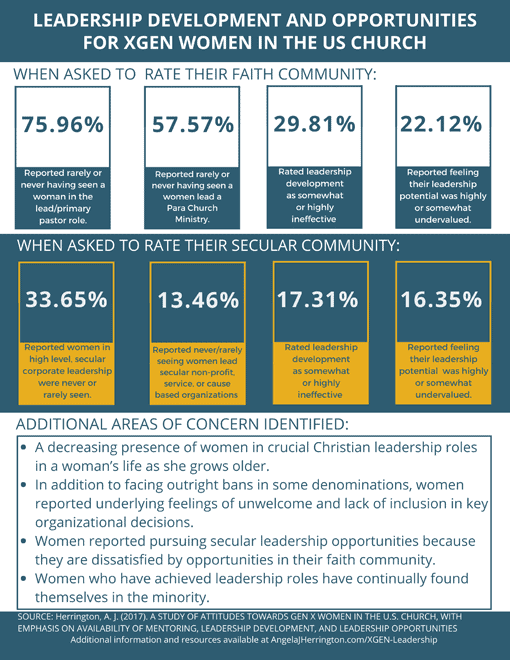Over the last decade I’ve worked with hundreds of GenX women who feel like outsiders in their own church.
They regularly tell me how passionate they are about serving their local church but sadly, they can’t seem to break into the leadership ranks. Many believe that if they work harder, pray more, or just “be better Christians”, they could earn their way into leadership roles. Which was puzzling to me, because most of these women are already wise, discerning, and highly capable of becoming Spirit led leaders.
I heard the same struggle described so many times, I decided to create the GenX Christian Women’s Leadership Research Project and formally get to the bottom of the issue.
In early 2017, I gathered quantitative and qualitative data about the attitudes towards Gen X women in the church, with a specific focus on leadership development and opportunities. In just a few weeks, over 100 women responded and provided powerful insight into their access to female leaders, leadership development, and opportunities to step into leadership roles both within the church and in their secular community.
What I discovered is troubling. As Christian women, we face an enormous bias in the majority of US churches.
What We Learned From The Research
-
At a crucial time when Baby Boomers are retiring and many Millennials are not ready to lead, Gen X Christian women are leaving the church and they’re taking their God given leadership skills with them.
-
There is biblical and historical evidence of women being called to lead both men and women, of varying ages.
-
Women describe feeling left out of the key conversations in the church, struggling to be taken seriously in the leadership positions they do hold, and bearing the brunt of unreasonable cultural expectations that men are not subject to.
-
Research has shown a deeply embedded systemic bias has prevented gifted women from leading.
-
Gen X Christian women in the US are facing the difficult choice to serve in an often hostile, unappreciative Christian organization, or take their leadership skills into the secular world where they are more valued and nurtured.
-
The US Church is losing the GenX Women who are highly effective leaders who value authenticity, community, and getting things done because the women feel more valued in secular organizations.
-
Women reported female leaders were less visible to girls as they aged. For example, women were highly visible in children’s ministry, but less visible in middle school, high school, and college ministries. Women in lead pastor and denominational leadership roles were rarely visible in most denominations. (The Wesleyan Church is a notable exception.)
-
Responses to the open ended question showed respondents were hurt, discouraged, and angry over the blatant gender bias present in the church.
-
Respondents also reported women were less prevalent in high level leadership roles within the church.
-
Women in secular organizations report a similar bias, but have overall made great strides to reduce the incidence of sexual discrimination, harassment, and policies biased against women. The big difference in the faith community, is that the idea that women are less authorized by God to lead is not an undercurrent in our culture.
-
The Christian bias against women is formally written into many denominational bylaws, preached from the pulpit, and enforced by local leadership teams.

Where We Go From Here (short/mid/long term goals of this project):
-
Our short term goal is to identify the individuals and organizations who are already winning this battle and capture their stories, advice, and allow them to inspire the next generation of leaders.
-
Our first mid-range goal is to be the go-to resource for all things related to X Gen Christian Women and leadership development, mentoring, and opportunities.
-
Our second mid-range goals is to identify individuals and organizations who are ready to make significant change in this area and give them the best possible resources.
-
Our long term goal is to eliminate gender bias and generational gaps in the US church.
Interested in sharing this research in your publication, podcast, news outlet, or at your event? I’d love to hear more!

What Needs to Change:
-
The problem of the poor engagement of Gen X women in the leadership of the US church has been is complicated by conflicting generational cultures, residual gender bias within the church, and the church’s inability to meet the spiritual needs of postmodern Gen X women. The only way the church breaks this cycle is by creating a culture where the value of women in leadership roles is no longer questioned and women of all ages have access to mentors in the area of life they sense God calling them to.
-
Organizations must stop phasing out access to female mentors and spiritual leaders as one moves out of children’s ministry. The bias against women in leadership roles limits the number of women leading, which in turn limits the number of female mentors available to raise up additional young women who are called to lead. When a young woman’s access to leadership development is limited, it is highly unlikely that she will be able to develop her skills at a comparable rate to her male counterparts with multiple opportunities to seek out male mentors
The Bottom Line:
God calls women to lead, preach, and teach and this project has presented historical, biblical, and sociological evidence to support a woman’s right, and even heavenly mandate, to lead. The church must move past the debate over whether or not women should be serving and begin calling out the unbiblical bias against women that allows the “should they be included” question to dominate the conversation. The lack of women in key leadership roles in the church cannot be corrected by simply acknowledging more women are needed. This research has shown a deeply embedded systemic bias has prevented gifted women from leading. It will require initiatives that insist on nothing less than deep systemic changes to overcome that bias.
A voice has been missing from our churches, and the women who responded to Phase I of this research project provided a small peek into the pain that exists within the voices that have been shut out.
Some of the brightest Christian minds in the country have felt undervalued and under nurtured by the organization charged with spiritual, emotional, and personal growth. Programs developed or adapted to include solutions to these findings could have a significant impact on reducing the number of Christian women leaving the church.

